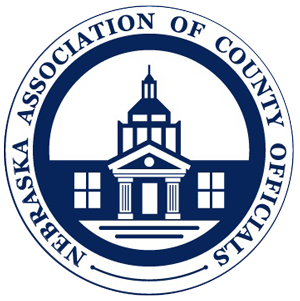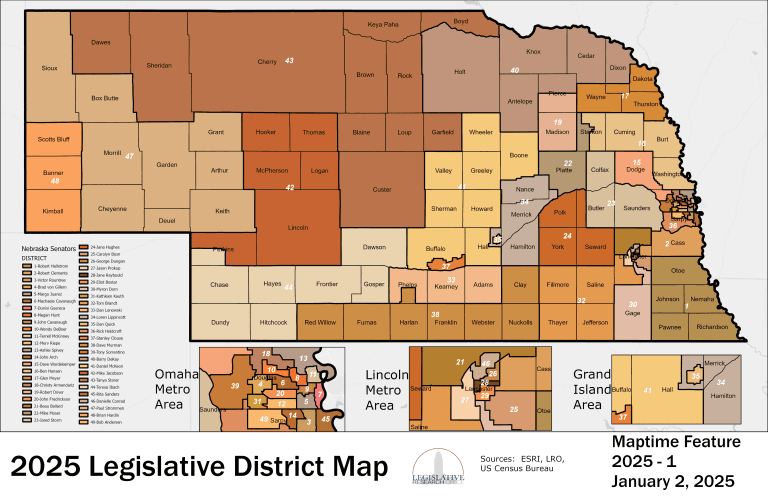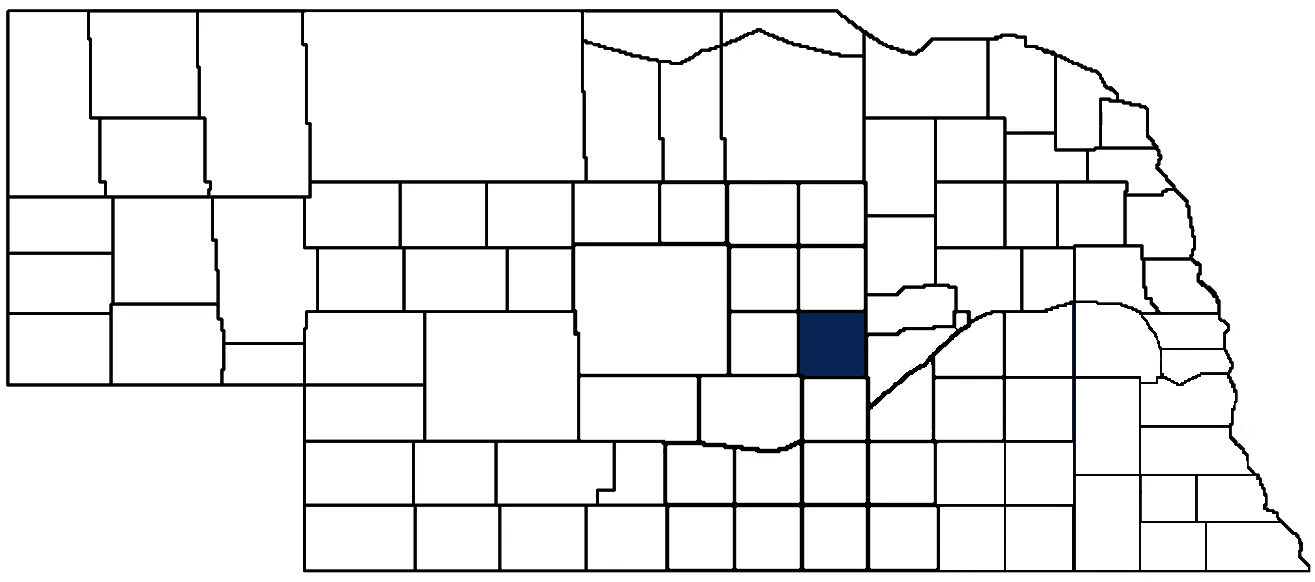- General Info
- Demographics
- Education and Employment
- Valuation and Taxes Levied
- State Senators
- History
- County Programs
- Other Information
Communities and Development
Howard County Seat: St. Paul
Total County Population: 6,475
- Cities (pop. & class): St. Paul (2,416 • 2nd Class)
- Villages (pop.): Cotesfield (29), Cushing (37), Dannebrog (273), Elba (192), Farwell (138), Howard City (Boelus) (181)
- Unincorporated Pop. (% of county pop.): 3,209 (50%) 2020
Land Development (% of total land in county):
- Agriculture: 91%
- By method: Pasture (pure grassland) (43%); Irrigated (row crop/grain/forage) (38%); Dryland (row crop/grain/forage) (9%) • Neb. Dept. of Rev. - total equals agriculture's %
- By commodity: Livestock (grassland) 42%, Corn 29%, Soybeans 15%, Alfalfa 4% • USDA - equals agriculture's % plus some wetlands (4%) and minus public grassland/wetlands and reserve
- Residential, Commercial, Industrial, Conservation Reserve & Exempt (combined): 9% 2022
County Offices
Courthouse Address and Hours:
612 Indian Street
St. Paul, Nebraska 68873
M-F 8:00 am - 5:00 pm
Complete list of county board members
County Board Meetings: 2nd & 4th Tuesday
View the County's Government Maps
NACO District: Central
General
Population: 6,475
Land area (sq. mi.): 569.34
Population per square mile: 11.4
Race and Age
Race 2020
White: 95.0%
African American: 0.2%
American Indian: 0.2%
Asian: 0.2%
Hispanic: 2.3%
Native Hawaiian and Pacific Islander: 0.0%
Two or More Races: 2.0%
Age 2020
0-17: 24.5%
18-64: 54.0%
65+: 21.5%
Households
Total households: 2,616 2020
With one child: 320 2022
With 2+ children: 460 2022
With seniors (65+): 750 2022
Socioeconomics
Median household income: $74,508 2023
% of Population in Poverty: 8.4% 2023
# of Housing Units: 2,865 2020
Owner-occupied rate: 79.5% 2020
Median home price: $221,970 Q4 2024
2024 building permits for detached single family homes: 19
2024 building permits for non-detached housing units: 2 (townhouse, duplex, or apt. unit)
Technology
Access to broadband (100 Mbps via fiber or cable modem): 59.2% 2021
Sources: National Association of Realtors, Nebraska Department of Revenue, Nebraska Legislature, Nebraska Library Commission, U.S. Bureau of Economic Analysis, U.S. Census Bureau (building permits), U.S. Census Bureau (demographics), U.S. Census Bureau (municipalities)
Employment, Schools, and Child Care
Unemployment rate: 2.4% March 2025
County Employment Website: https://howardcounty.ne.gov/webpages/employment/employment.html
High school graduate or higher: 96.0% 2020
School Districts: Central Valley Public Schools, Centura Public Schools, Loup City Public Schools, Northwest Public Schools, Palmer Public Schools, St. Paul Public Schools
Bachelor's degree or higher: 21.7% 2020
Community College Service Area: Central Community College
Countywide child care capacity: 9 providers; 215 children 2024
Find child care: For a list of child care providers in your zip code, visit Nebraska DHHS or the Nebraska Resource and Referral System.
Howard County Economy
Annual Gross Domestic Product (GDP): $317,373,000 2023
Nonfarm Small Business Receipts: $43,380,356 2022
Nonfarm Wage Income: $148,152,000 2022
Farm and Ranch Commodity Sales Receipts: $306,576,000 2022
Farm and Ranch Operations (Non-Sales) Receipts: $13,413,000 2022
- For components of nonfarm small business receipts, nonfarm wage income, and farm & ranch commodity sales and operations receipts, see "Notes" below.
Cattle Producers: 277
- Pastureland Cash Rent (avg.): $50/acre/yr 2024
Crop Producers: 299
Grain Elevators by Location (bushels capacity):
- St. Paul: Viterra (4,020,000)
- (1 bushel = 56 lbs. corn/sorghum, 60 lbs. soybeans/wheat; % max. moisture = 18% beans, 15.5% corn, 14% sorghum/soybeans, 13.5% wheat)
Other Grain Purchasers: St. Paul Co-Op Grain Association
Railroad Miles: 62.50 main, 4.56 side
- Places with Railroad Service: Cotesfield, Elba, St. Libory, St. Paul
Local Grain Market: Click for today's grain prices in Howard County
Electricity Providers: City of St. Paul, Howard Greeley Rural PPD, Nebraska PPD, Southern PPD
Irrigation and Drinking Water
Rural Irrigation Wells: 1,189 2024
Rural Livestock Wells: 276 2024
Rural Commercial/Industrial Wells: 10 2024
Rural Drinking Water Wells: 693 2024
Drinking Water Utility Connections: 1,365 Residential; 209 Commercial; 10 Industrial 2024
Surface Water Diversions (Irrigation): 143 2024
Click for real time:
Streamflow data on the Middle Loup River at St. Paul
Streamflow data on the North Loup River near St. Paul
Notes
Howard County Economy
- Nonfarm small business receipts are reported by partnerships and sole proprietorships. They do not include receipts reported by cooperative associations.
- Nonfarm wage income is reported based upon the wage earner's residential address; therefore, it also includes wages earned by Howard County residents in other counties or states, but it excludes wages earned in Howard County by residents of other counties or states.
- Nonfarm wage income excludes wages earned by anyone claimed as a dependent.
- Farm and ranch commodity sales receipts and operations receipts are reported based upon the farm or ranch owner's principal county of operations; therefore, those figures also include receipts reported by producers operating principally in Howard County for their production in other counties or states, but the figures exclude receipts reported for production in Howard County by producers operating principally in other counties or states.
Irrigation and Drinking Water
- A rural irrigation well is any well intended for irrigating crops that, either on its own or as part of a set of commingled wells, is capable of pumping more than fifty (50) gallons of water per minute (gpm). Note that some rural commercial/industrial wells are also capable of pumping more than 50 gpm. In Nebraska, the owner of any well--or set of commingled wells--that is capable of pumping more than 50 gpm must register the well(s) with the state government and have a permit for the well(s) from the local natural resource district (NRD).
- Rural livestock wells and rural drinking water (also known as "domestic") wells are not allowed to pump more than 50 gpm unless permitted by the local NRD. Each rural drinking water well usually serves one single family home, though in rare cases a rural drinking water well serves multiple homes.
- Data on rural livestock wells and rural drinking water wells may be incomplete for wells drilled prior to September 9, 1993. State law does not require wells drilled prior to that date to be registered with the state government if the wells are not capable of pumping more than 50 gpm. Neb. Rev. Stat. § 46-735; see Laws 1993, LB 131, § 25.
Sources: National Agricultural Statistics Service (USDA), Nebraska Cooperative Council, Nebraska Coordinating Commission for Postsecondary Education, Nebraska Department of Health and Human Services, Nebraska Department of Revenue, Nebraska Department of Transportation, Nebraska Office of the CIO, Nebraska Power Review Board, Nebraska Public Service Commission, U.S. Bureau of Economic Analysis, U.S. Bureau of Labor Statistics, U.S. Census Bureau, U.S. Energy Information Administration, U.S. Department of the Treasury (IRS), Warehouse and Commodity Management Division (USDA)
2024 Levies and Valuation
County levy rate: $0.1536 per $100 of taxable valuation
County property taxes levied: $2,483,446
Total local government property taxes levied: $19,767,116
Total countywide taxable valuation: $1,616,729,213
Federal PILT payment to Howard County (FY2024): $3,713 regarding 1,109 federally-owned acres
Click here for all levy rates in Howard County
County Levy and Taxation Laws
Levy limits:
Since 1996, counties and other political subdivisions have been subject to the levy limits listed in Neb. Rev. Stat. § 77-3442 and Neb. Rev. Stat. § 77-3443.
Statutes and regulations:
Nebraska Revised Statutes (Chapter 77)
Nebraska Administrative Code (Title 350)
Local tax reductions, exemptions, and credits:
Neb. Rev. Stat. § 76-902(5)(a) (Deed "stamp tax" exemption): "The [stamp tax] shall not apply to: ... (5)(a) Deeds between spouses, between ex-spouses for the purpose of conveying any rights to property acquired or held during the marriage, or between parent and child, without actual consideration therefor."
Neb. Rev. Stat. § 77-201(2) (Valuation of agricultural land and horticultural land): "Agricultural land and horticultural land as defined in section 77-1359 shall constitute a separate and distinct class of property for purposes of property taxation, shall be subject to taxation, unless expressly exempt from taxation, and shall be valued at seventy-five percent of its actual value, except that for school district taxes levied to pay the principal and interest on bonds that are approved by a vote of the people on or after January 1, 2022, such land shall be valued at fifty percent of its actual value."
Neb. Rev. Stat. § 77-6703(1) (Tax credit for school district taxes paid): "(1) For taxable years beginning or deemed to begin on or after January 1, 2020, under the Internal Revenue Code of 1986, as amended, there shall be allowed to each eligible taxpayer a refundable credit against the income tax imposed by the Nebraska Revenue Act of 1967 or against the franchise tax imposed by sections 77-3801 to 77-3807. The credit shall be equal to the credit percentage for the taxable year, as set by the department under subsection (2) of this section, multiplied by the amount of school district taxes paid by the eligible taxpayer during such taxable year."
Sources: Nebraska Department of Revenue
State Senator: Daniel D. McKeon (District 41)
Committees
- Agriculture
- Business and Labor
- Government, Military and Veterans Affairs
- Building Maintenance
Map and statistics for Legislative District 41
Map of all districts in the Nebraska Unicameral Legislature
Howard County History
Number of Registered Historic Places: 7
Year Authorized: 1871
Year Organized: 1871
Etymology: Oliver Howard (U.S. army general)
Howard County, bisected by two veins of the Loup River and marked by rolling hills, was originally part of Hall County. In 1871, following extensive research conducted by two government surveyors, James and Nicholas Paul, the Nebraska Legislature carved Howard County from the northern part of Hall County. The county was named after Civil War General Oliver Howard (nicknamed the “Christian General”), a staunch abolitionist who would later lead the Freedman’s Bureau.
Following its formal organization, Howard County grew quickly and gained over 4,000 residents in its first decade. By 1900, the population had swelled to 10,000 people. Notably, the Paul brothers not only surveyed the county in the 1860’s, they also helped found the county’s first permanent settlement and eventual county seat. The brothers suggested naming the town “Athens,” but a post office in Nebraska already bore that name. Phineas Hitchcock (the namesake of Hitchcock County, later organized in 1873) suggested naming the town after the Paul brothers, and hence, St. Paul became Howard County’s first and only county seat. Remarkably, unlike in other Nebraska counties, the decision over the county seat was uncontroversial and enduring, likely due to St. Paul’s central location and early founding.
Howard County is rich in history and notable figures. Lieutenant General Clarence Irvine, known for his work helping develop the legendary B-29, was born in Howard County. One of Nebraska’s most famous edibles, Dorothy Lynch dressing, was created by the woman herself in Howard County. Grover Cleveland Alexander also hailed from Howard County and later retired to St. Paul following his Hall of Fame baseball career and 373 career wins (3rd all-time). Each year, residents celebrate Grover Cleveland Alexander Days, a festival that features music, food, sporting tournaments, and of course, baseball.
Finally, it’s impossible to describe Howard County’s history without noting its courthouse, a three-story Bedford Stone (or white limestone) building constructed in 1913 that also features a memorial to Civil War veterans. Throughout its history, the courthouse has welcomed many different types of tenants, including not only the jail, courtroom, and county officials, but also the public library and the Grand Army of the Republic (a Civil War veterans organization).
Highlight an important program from your county in this space! Send an email to:
Local Highlights
License Plate Number: 49
Time Zone: Central
Number of Veterans: 374 2023
Zoned County: Yes
County Hospital: Howard County Medical Center
Number of County-Owned Bridges: 132
Number of County-Owned Dams: 2
Election Data
General Election Turnout: 77% 2024
Total Registered Voters: 4,668 2024
Number of Precincts: 8 2022
Number of Election Day Polling Places: 7 2022
Land Area per Polling Place (avg.): 81.33 sq. miles
Intergovernmental Data
Emergency Mgt. Planning, Exercise and Training (PET) Region: East Central
Natural Resource Districts: Central Platte NRD, Lower Loup NRD
State Lands (acres): Harold W. Andersen WMA (272), Leonard A. Koziol WMA (327.70), Marsh Wren WMA (153), Loup Bottoms WMA (86.60), North Loup SRA (19.56)
Sources: Nebraska Department of Transportation, Nebraska Emergency Management Agency, Nebraska Game & Parks Commission, Nebraska Legislature, Nebraska Office of the CIO, Nebraska Secretary of State, U.S. Department of Veterans Affairs, U.S. Election Assistance Commission, U.S. National Archives and Records Administration (eCFR)



